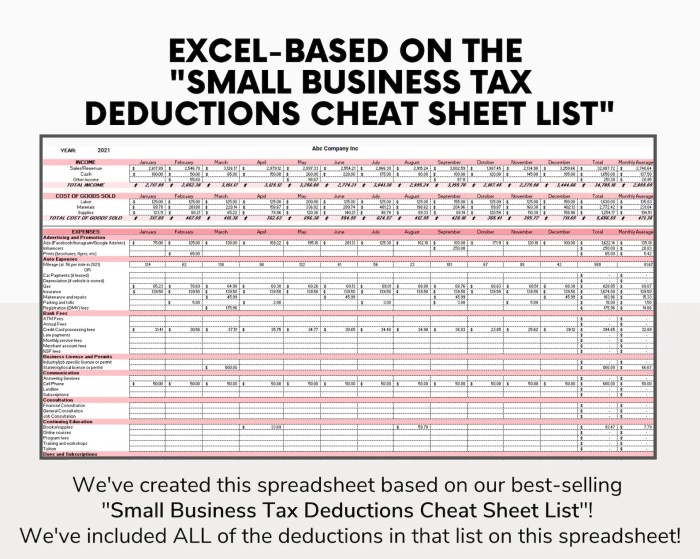Tax deductions for small businesses sets the stage for this enthralling narrative, offering readers a glimpse into a story that is rich in detail and brimming with originality from the outset. As small businesses navigate the complex world of taxes, understanding the importance of deductions can be a game-changer in saving money and improving financial health.
From eligibility criteria to common deductions and optimization strategies, this guide delves into the key aspects of maximizing tax benefits for small businesses. Get ready to uncover the secrets to unlocking substantial savings and enhancing cash flow through savvy tax planning.
Importance of Tax Deductions for Small Businesses
Tax deductions play a crucial role in helping small businesses reduce their taxable income, allowing them to save money and improve cash flow. By taking advantage of eligible deductions, small businesses can lower their overall tax liability and reinvest those savings back into the business for growth and expansion.
Examples of Common Tax Deductions for Small Businesses
- Business Expenses: Deductible expenses such as office supplies, rent, utilities, and travel costs can help reduce taxable income.
- Home Office Deduction: Small business owners who work from home may be able to deduct a portion of their mortgage or rent, utilities, and other home-related expenses.
- Vehicle Expenses: Deducting mileage or actual expenses related to business use of a vehicle can result in significant savings for small businesses.
- Health Insurance Premiums: Small businesses that provide health insurance for employees can generally deduct the cost of premiums.
How Tax Deductions Can Help Businesses Save Money
By strategically utilizing tax deductions, small businesses can lower their taxable income, resulting in reduced tax liability. This means more money stays within the business, allowing for increased investment in operations, hiring new employees, or expanding product lines. Ultimately, tax deductions can provide small businesses with the financial flexibility needed to thrive and succeed in a competitive market.
Eligibility Criteria for Small Businesses

To qualify for tax deductions, small businesses must meet specific criteria set by the IRS. These criteria help determine which businesses are eligible for various deductions based on their size, structure, and activities.
Types of Businesses Eligible for Specific Tax Deductions
- Sole Proprietorships: Sole proprietors can deduct business expenses such as office supplies, marketing costs, and travel expenses.
- Partnerships: Partnerships can claim deductions for salaries paid to partners, business-related travel, and professional fees.
- S Corporations: S Corps are eligible for deductions on salaries, employee benefits, and business insurance premiums.
- Limited Liability Companies (LLCs): LLCs can deduct costs related to operating the business, including rent, utilities, and equipment purchases.
Limitations and Restrictions for Small Businesses
- Home Office Deduction: Small businesses must meet specific criteria to claim a home office deduction, including using a portion of their home exclusively for business purposes.
- Vehicle Expenses: Businesses can deduct vehicle expenses, but there are limitations on personal use versus business use that need to be carefully tracked and documented.
- Entertainment Expenses: While some entertainment expenses are deductible, there are restrictions on what qualifies, such as the business purpose of the expense and the individuals involved.
Common Tax Deductions for Small Businesses
When it comes to tax deductions for small businesses, there are several opportunities to save money and reduce taxable income. By taking advantage of these deductions, small business owners can keep more of their hard-earned profits.
Home Office Expenses
Running a business from home? You may be eligible to deduct a portion of your home expenses, such as rent, utilities, and insurance. To qualify, your home office must be used exclusively for business purposes.
Business Travel
Traveling for business purposes can also lead to tax deductions. This includes expenses for transportation, lodging, meals, and even conference fees. Keep detailed records of all your business-related travel to claim these deductions.
Equipment Purchases
Purchasing equipment for your business, such as computers, machinery, or furniture, can be tax-deductible. Small businesses can either deduct the full cost of the equipment in the year it was purchased or take depreciation deductions over several years.
Maximizing Deductions
To maximize your tax deductions, it’s essential to maintain accurate records of all expenses related to your business. Keep receipts, invoices, and any other supporting documents organized and easily accessible. This will help you claim all eligible deductions and minimize the risk of audits.
Comparing Deductions
When determining which deductions to prioritize, consider the potential tax savings and the impact on your overall financial situation. Some deductions may provide more significant benefits than others, so it’s crucial to evaluate your options carefully.
Strategies to Optimize Tax Deductions
When it comes to optimizing tax deductions for small businesses, strategic planning is key. By taking proactive measures throughout the year, businesses can maximize their deductions and minimize their tax liability.
Keep Detailed Records
Maintaining accurate and detailed records of all business expenses is crucial for maximizing tax deductions. This includes keeping receipts, invoices, and other documentation to support deductions claimed on tax returns.
Take Advantage of Tax Credits
In addition to deductions, small businesses should also explore available tax credits that can help reduce their tax liability. Research and identify tax credits that your business may qualify for and take advantage of them.
Invest in Retirement Plans
Contributing to retirement plans not only helps secure your financial future but can also provide tax benefits. Small businesses can deduct contributions made to retirement plans such as SEP IRAs or Solo 401(k)s, reducing their taxable income.
Plan for Major Purchases
Timing major purchases strategically can help businesses maximize deductions. Consider making large equipment purchases or investments in the final months of the year to take advantage of immediate deductions or depreciation benefits.
Hire a Professional
Working with a tax professional or accountant can help small businesses navigate complex tax laws and identify additional deductions they may have overlooked. A professional can provide guidance on tax planning strategies tailored to your business’s specific needs.
